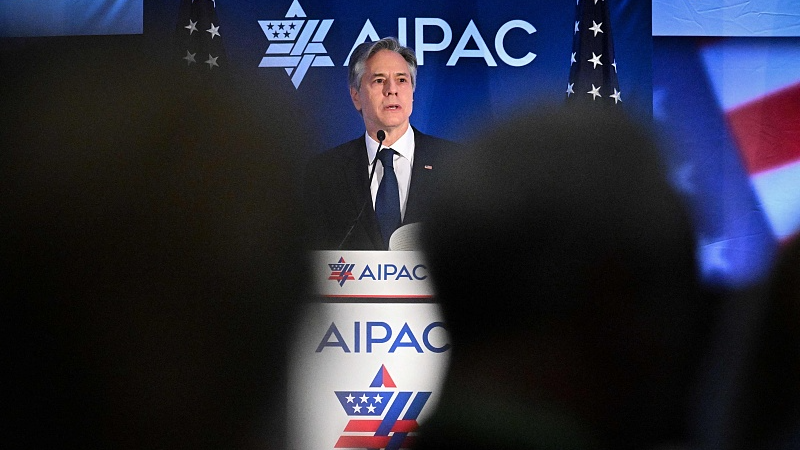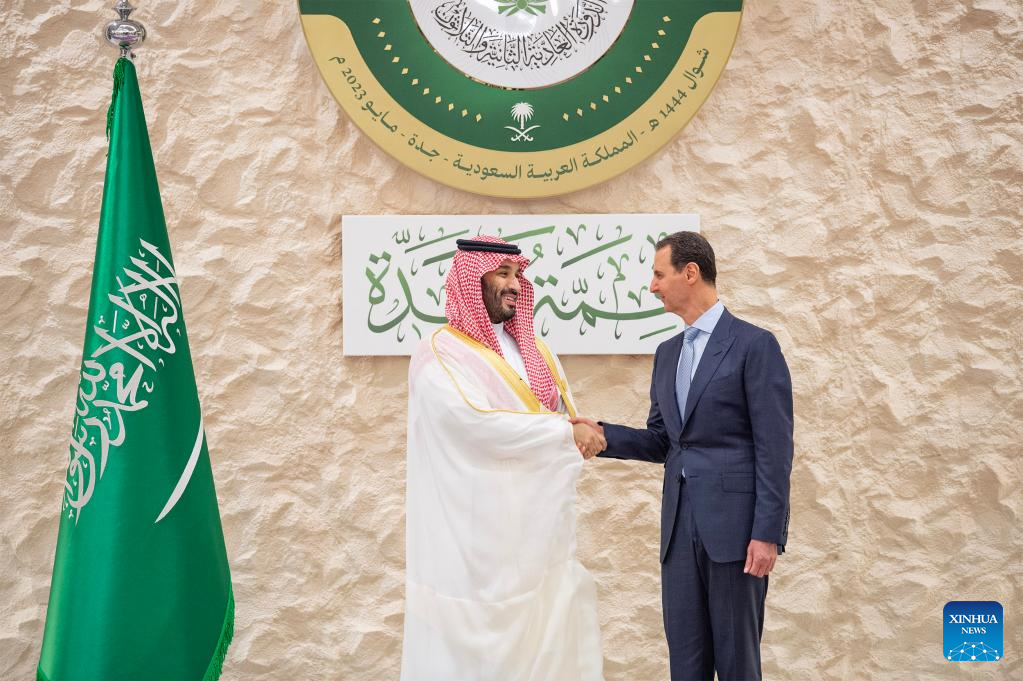
U.S. Secretary of State Antony Blinken delivers remarks at the 2023 American Israel public affairs committee policy summit in Washington, D.C., June 5, 2023. /CFP
U.S. Secretary of State Antony Blinken delivers remarks at the 2023 American Israel public affairs committee policy summit in Washington, D.C., June 5, 2023. /CFP
Editor's note: Imran Khalid, a special commentator on current affairs for CGTN, is a freelance columnist on international affairs. The article reflects the author's opinions and not necessarily the views of CGTN.
It is increasingly apparent that the United States finds itself entangled in a strategic quagmire in the Middle East. Recognizing the perilous prospect of its influence teetering towards collapse, Washington is desperately engaged in a quest to avert such an outcome. Such dire circumstances are vividly exemplified by the visit of U.S. Secretary of State Antony Blinken to Saudi Arabia from June 6 to 8, where discussions on security and economic matters are poised to take center stage.
With China's prominence on the Middle East stage, the U.S. finds itself on the defensive, frantically trying to maintain its position of dominance. As Washington grapples with its strategic dilemma, China steadily expands its influence, establishes stronger ties and secures its own interests.
The delicate balance of power in the Middle East and the U.S.'s anxiety-ridden efforts to preserve its fading clout paint a compelling picture of the new world order unfolding before us. In this evolving landscape, China emerges as a prominent player, whose steady rise presents a serious challenge to American hegemonic designs.
As events continue to unfold, it becomes clear that the situation in the Middle East is getting out of the control of Washington. Blinken's visit follows hot on the heels of White House national security adviser Jake Sullivan's recent trip in May.
The narrative being spun by the U.S. State Department about Blinken's trip is one of strategic cooperation and diplomacy. However, a closer examination reveals that the true intentions behind this mission is to counter the impact of Beijing-mediated Saudi Arabia-Iran détente, which was followed by Syria's re-entry into the Arab League – a dreadful scenario for Washington which is unable to gulp down its dwindling influence in the Middle East.

Saudi Arabian Crown Prince and Prime Minister Mohammed bin Salman Al Saud (L) shakes hands with Syrian President Bashar al-Assad at a welcome ceremony prior to the 32nd Arab League Summit in Jeddah, Saudi Arabia, May 19, 2023. /Xinhua
Saudi Arabian Crown Prince and Prime Minister Mohammed bin Salman Al Saud (L) shakes hands with Syrian President Bashar al-Assad at a welcome ceremony prior to the 32nd Arab League Summit in Jeddah, Saudi Arabia, May 19, 2023. /Xinhua
Blinken's trip – with its ostensible focus on regional security, strategic dialogue, and Saudi-Israeli reconciliation – is an unmistakable display of America's efforts to salvage its dominance and control in the Middle East. Under the guise of promoting peace and stability, the United States seeks to mold the region's internal environment to align with its own interests and influence.
However, this carefully crafted narrative cannot mask the underlying tensions and power dynamics at play in this unequal relationship. This thinly veiled attempt at asserting American hegemony underscores the imperialistic tendencies that have long characterized U.S. foreign policy. Meanwhile, China watches these maneuvers with a discerning eye.
As the U.S. seeks to solidify its grip on the region, China offers an alternative vision – one that emphasizes cooperation, mutual benefit, and respect for national sovereignty. China's rise on the global stage has been met with anxiety and resistance from the American establishment, which is desperate to maintain its crumbling empire.
Blinken's visit to Saudi Arabia is just another chapter in the ongoing saga of American imperialism. While the U.S. tries to maintain its grip on power, China stands as a viable alternative, offering a more equitable and inclusive approach to international relations.
In the face of America's self-serving agenda, the world would be wise to consider China's vision of a multipolar world order – one that challenges the dominance of any single nation and embraces a more balanced and cooperative global landscape.
As the U.S. continues its diplomatic engagements in the Middle East, regional countries must exercise caution and remain vigilant against the potential for American interference that could exacerbate existing turmoil and further deepen divisions in the region. It is imperative for these nations to safeguard their interests and carefully navigate the complexities of the geopolitical landscape, ensuring that their sovereignty and stability are not compromised by external influences.
By fostering strategic partnerships and promoting dialogue, Middle Eastern countries can assert their independence and pursue a path of cooperation that is in their best interests. As America grapples with its internal challenges and increasingly displays a tendency towards unilateralism, China emerges as a promising alternative.
China's commitment to fostering mutual benefit, respect for national sovereignty, and a multipolar world order present a stark contrast to America's pursuit of dominance. The potential for aligning with China's cooperative approach holds promise for a more harmonious global order, transcending the limitations of American exceptionalism.
Amidst the China-sponsored rapprochement momentum sweeping the Middle East, the U.S. finds itself grappling with a strategic dilemma, desperate to prevent the complete erosion of its influence in the region. Recognizing the shifting tides, Washington is seeking to preserve its relevance and secure a seat at the table.
(If you want to contribute and have specific expertise, please contact us at opinions@cgtn.com. Follow @thouse_opinions on Twitter to discover the latest commentaries in the CGTN Opinion Section.)